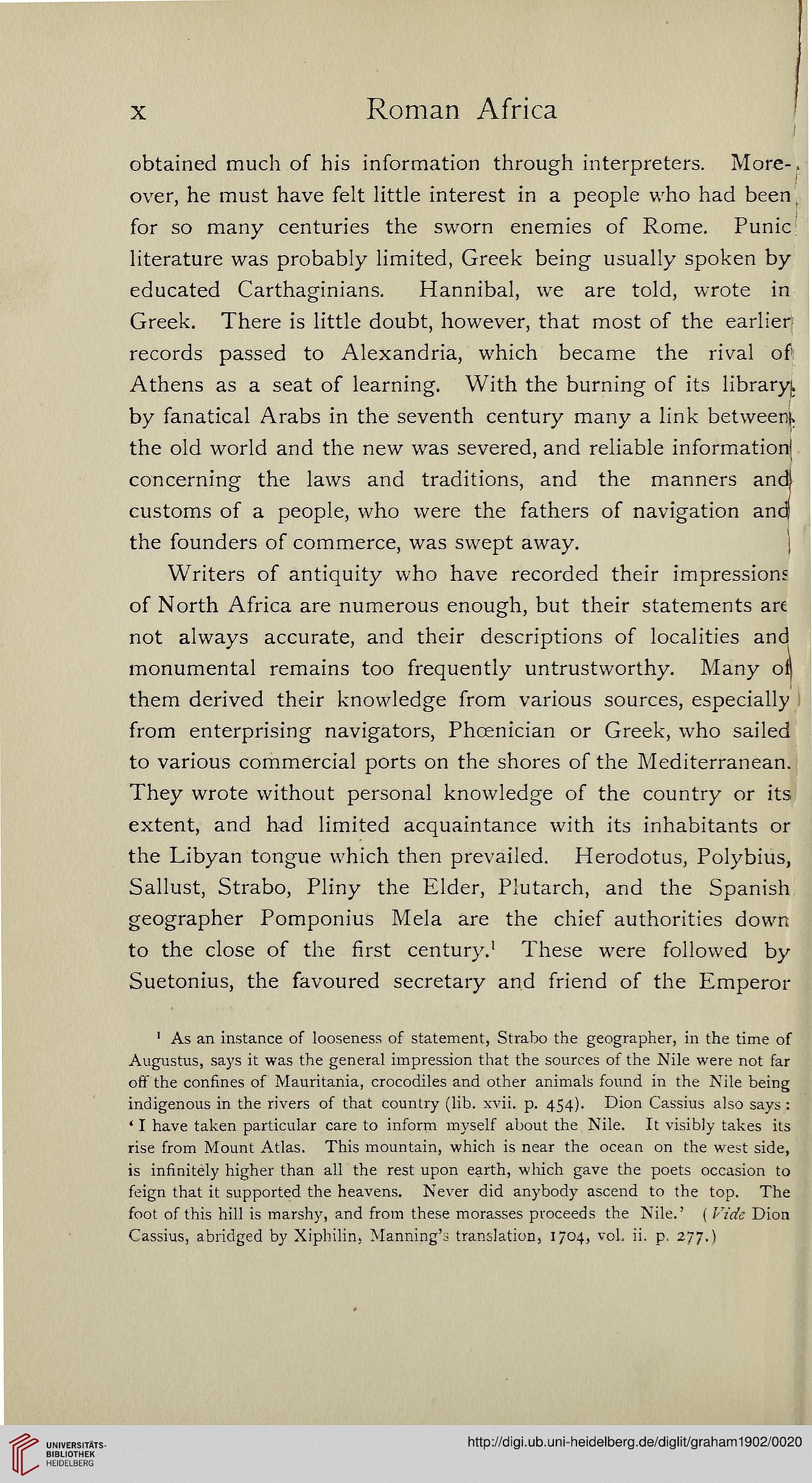X
Roman Africa
obtained much of his information through interpreters. More-
over, he must have felt little interest in a people who had been
for so many centuries the sworn enemies of Rome. Punic
literature was probably limited, Greek being usually spoken by
educated Carthaginians. Hannibal, we are told, wrote in
Greek. There is little doubt, however, that most of the earlier
records passed to Alexandria, which became the rival of
Athens as a seat of learning. With the burning of its library!,
by fanatical Arabs in the seventh century many a link between},
the old world and the new was severed, and reliable information!
concerning the laws and traditions, and the manners and}
customs of a people, who were the fathers of navigation and;
the founders of commerce, was swept away. j
Writers of antiquity who have recorded their impressions
of North Africa are numerous enough, but their statements are
not always accurate, and their descriptions of localities and
monumental remains too frequently untrustworthy. Many ofj
them derived their knowledge from various sources, especially
from enterprising navigators, Phoenician or Greek, who sailed
to various commercial ports on the shores of the Mediterranean.
They wrote without personal knowledge of the country or its
extent, and had limited acquaintance with its inhabitants or
the Libyan tongue which then prevailed. Herodotus, Polybius,
Sallust, Strabo, Pliny the Elder, Plutarch, and the Spanish
geographer Pomponius Mela are the chief authorities down
to the close of the first century.1 These were followed by
Suetonius, the favoured secretary and friend of the Emperor
1 As an instance of looseness of statement, Strabo the geographer, in the time of
Augustus, says it was the general impression that the sources of the Nile were not far
off the confines of Mauritania, crocodiles and other animals found in the Nile being
indigenous in the rivers of that country (lib. xvii. p. 454). Dion Cassius also says :
' I have taken particular care to inform myself about the Nile. It visibly takes its
rise from Mount Atlas. This mountain, which is near the ocean on the west side,
is infinitely higher than all the rest upon earth, which gave the poets occasion to
feign that it supported the heavens. Never did anybody ascend to the top. The
foot of this hill is marshy, and from these morasses proceeds the Nile.' ( Vide Dion
Cassius, abridged by Xiphilin. Manning's translation, 1704, vol, ii. p, 277.)
Roman Africa
obtained much of his information through interpreters. More-
over, he must have felt little interest in a people who had been
for so many centuries the sworn enemies of Rome. Punic
literature was probably limited, Greek being usually spoken by
educated Carthaginians. Hannibal, we are told, wrote in
Greek. There is little doubt, however, that most of the earlier
records passed to Alexandria, which became the rival of
Athens as a seat of learning. With the burning of its library!,
by fanatical Arabs in the seventh century many a link between},
the old world and the new was severed, and reliable information!
concerning the laws and traditions, and the manners and}
customs of a people, who were the fathers of navigation and;
the founders of commerce, was swept away. j
Writers of antiquity who have recorded their impressions
of North Africa are numerous enough, but their statements are
not always accurate, and their descriptions of localities and
monumental remains too frequently untrustworthy. Many ofj
them derived their knowledge from various sources, especially
from enterprising navigators, Phoenician or Greek, who sailed
to various commercial ports on the shores of the Mediterranean.
They wrote without personal knowledge of the country or its
extent, and had limited acquaintance with its inhabitants or
the Libyan tongue which then prevailed. Herodotus, Polybius,
Sallust, Strabo, Pliny the Elder, Plutarch, and the Spanish
geographer Pomponius Mela are the chief authorities down
to the close of the first century.1 These were followed by
Suetonius, the favoured secretary and friend of the Emperor
1 As an instance of looseness of statement, Strabo the geographer, in the time of
Augustus, says it was the general impression that the sources of the Nile were not far
off the confines of Mauritania, crocodiles and other animals found in the Nile being
indigenous in the rivers of that country (lib. xvii. p. 454). Dion Cassius also says :
' I have taken particular care to inform myself about the Nile. It visibly takes its
rise from Mount Atlas. This mountain, which is near the ocean on the west side,
is infinitely higher than all the rest upon earth, which gave the poets occasion to
feign that it supported the heavens. Never did anybody ascend to the top. The
foot of this hill is marshy, and from these morasses proceeds the Nile.' ( Vide Dion
Cassius, abridged by Xiphilin. Manning's translation, 1704, vol, ii. p, 277.)




